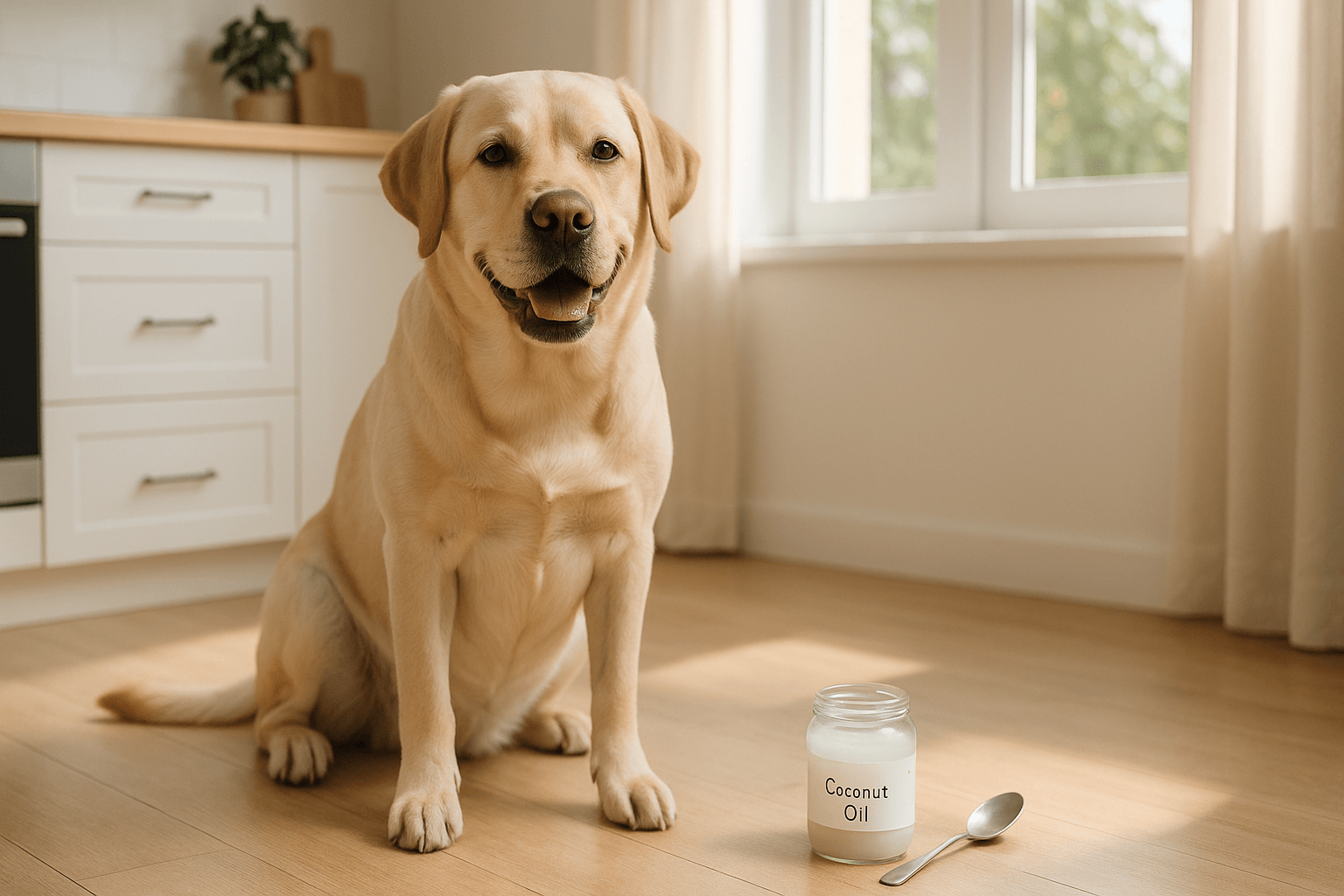Coconut oil has made its way from kitchen shelves to wellness routines—and now, it’s a rising star in the world of pet care. If you’re a dog parent wondering whether coconut oil is good for dogs, the short answer is yes—but with some precautions. This natural remedy has gained popularity for its range of potential health benefits, from shiny coats to digestive support.
In this article, we’ll explore everything you need to know about coconut oil for dogs, including how to use it safely, its pros and cons, health benefits, and answers to the most common questions.
What Is Coconut Oil and Why Is It Used for Dogs?
Coconut oil is a plant-based oil extracted from the meat of mature coconuts. It’s rich in medium-chain triglycerides (MCTs)—especially lauric acid, which has antibacterial, antifungal, and anti-inflammatory properties. These unique qualities make it a go-to natural supplement for pet owners looking to boost their dog’s health, both inside and out.
Is Coconut Oil Good for Dogs?
Yes, coconut oil can be beneficial for dogs—when used appropriately. It can help improve skin health, aid digestion, support cognitive function in older dogs, and even freshen your pup’s breath.
However, it's important to note that not all dogs will react the same way, and moderation is key. Always consult your vet before adding any new supplement to your dog’s diet.
Health Benefits of Coconut Oil for Dogs
1. Improves Skin and Coat Health
Coconut oil can act as a natural moisturizer for dry, itchy, or flaky skin.
- Helps reduce hot spots and allergic reactions
- Promotes a shinier, softer coat
- Can be used topically for minor cuts and skin irritations
2. Supports Digestive Health
Adding a small amount to your dog’s food may:
- Improve digestion
- Relieve constipation
- Help absorb fat-soluble vitamins
3. Boosts Immune Function
Lauric acid in coconut oil may help fight off viruses, bacteria, and parasites, making it a natural immune booster.
4. Aids in Weight Management
MCTs are known to increase energy expenditure and may help maintain a healthy weight when used alongside a balanced diet.
5. Improves Cognitive Function in Senior Dogs
Some studies suggest MCTs in coconut oil may enhance brain function and slow cognitive decline in older dogs.
How to Use Coconut Oil for Dogs (Safely)
✅ Feeding Guidelines:
Start with small doses to assess your dog’s tolerance.
- Small dogs (under 15 lbs): ¼ tsp per day
- Medium dogs (15–35 lbs): ½ tsp per day
- Large dogs (35+ lbs): 1 tsp per day
Gradually increase to 1 tsp per 10 pounds of body weight daily if tolerated.
✅ Topical Use:
Rub a small amount directly on dry patches, minor cuts, or itchy areas. You can also massage it through your dog’s coat for a shiny, healthy finish.
⚠️ Note:
Always choose virgin or cold-pressed, organic coconut oil for the best results.
Pros and Cons of Coconut Oil for Dogs
✅ Pros:
- Natural and affordable remedy
- Supports overall health
- Easy to administer orally or topically
- May help with weight management and digestion
- Can promote dental health when used in moderation
❌ Cons:
- High in saturated fat—can cause weight gain if overused
- May cause diarrhea or greasy stools in sensitive dogs
- Not suitable for dogs with pancreatitis or fat metabolism issues
- Needs to be introduced gradually
Final Thoughts: Is Coconut Oil Right for Your Dog?
Coconut oil offers a range of potential benefits for dogs—from improving skin health to boosting immunity. While it’s not a miracle cure, when used responsibly and in moderation, it can be a powerful natural supplement in your dog’s wellness routine.
Ready to give coconut oil a try? Start slow, choose high-quality oil, and monitor your dog’s response. As always, consult your vet before introducing any new supplement into your pup’s diet.
Frequently Asked Questions (FAQs)
1. Can I give my dog coconut oil every day?
2. Can coconut oil help my dog’s bad breath?
3. Is coconut oil safe for puppies?
4. Can I brush my dog’s teeth with coconut oil?
5. What kind of coconut oil should I use?

About SniffnTail
SniffnTail is your go-to destination for everything pets. From helpful advice, tips, and insights to thoughtfully selected products and resources, we’re here to support pet owners at every stage of their journey. Whether you're caring for a playful pup, a wise old cat, or anything in between, SniffnTail offers tools and knowledge to make pet parenting easier and more joyful.
Related Articles
 Nutrition • 6 min read
Nutrition • 6 min readCan Dogs Eat Oranges? What Every Pet Parent Needs to Know About Citrus Fruits
Are oranges safe or harmful to dogs? Learn the truth about dogs eating citrus fruits, plus health tips and feeding dos and don'ts from a certified pet expert.
 Nutrition • 5 mins Read
Nutrition • 5 mins ReadThe Best Dog Food by Breed: A Comprehensive Guide
Feeding your dog a diet tailored to its breed can significantly enhance its health, energy, and longevity. Different breeds have unique needs due to their size, metabolism, activity level, and genetic predispositions. Here is a detailed guide to the best types of food for various dog breeds
 Nutrition • 7 min read
Nutrition • 7 min read10 Best Healthy Dog Treats Your Pup Will Love (Vet-Approved! 2025 Guide)
Unlock your pup's health! Explore 10 vet-approved, natural, organic, and homemade dog treats. Perfect for sensitive stomachs, training, & guilt-free spoiling. Get expert tips & recipes inside!

